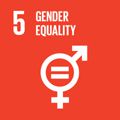Design for Good has launched a global non-profit alliance of industry-leading companies and institutions across private sector, academia and social sectors with the ambition of enacting measurable positive impact against the United Nations' Sustainable Development Goals (UN SDGs), on a scale only possible through global collaboration.

Source: Supplied
The founding alliance comprises General Mills, Logitech, McKinsey & Company, Microsoft led by Xbox, Nedbank, Nestlé, PepsiCo, Philips and the Royal College of Art, with the aspiration of many more of the world’s leading organisations to join soon.
The design leaders at each of the founding companies will make up an advisory council that unleashes and supports the 5,000-strong design community across all nine organisations to voluntarily participate in an unprecedented nine-month initiative to design and develop open-source products and services to address some of society’s biggest challenges.
Lia Labuschagne,
SAICA 27 Aug 2021 Each year, Design for Good will focus on one UN SDG. This year, in its inaugural year, Design for Good will seek to address Goal 6, focused on clean water and sanitation. According to the UN’s
Progress towards the Sustainable Development Goals report, billions of people worldwide live without safely managed drinking water, sanitation and hygiene services, which are critical for protecting human health.
Gilbert Houngbo, chair of UN-water, is a trustee of Design for Good and will help cultivate the support of local NGOs in communities most affected to provide insights into real-world needs and constraints, to ensure designers’ solutions are sustainable.
Design solutions may address issues such as access to adequate and equitable sanitation and hygiene, the promotion of desalination, wastewater treatment, recycling and reuse technologies or the implementation of integrated water resources management.
Framework of Design for Good
- Founding partners commit investment of up-front funding and resource from design community within each organisation;
- Volunteer designers, with the support of their organisation, individually sign up to contribute five days of their time towards ideating, researching and prototyping a product or service that responds to the designated UN Sustainable Development Goal;
- Designers will collaborate across regions, organisations and disciplines on the possible thousands of design-focused and human-centric solutions, with support from local NGOs to provide insight into real user needs and constraints from the outset;
- Solutions are to be submitted after six months and assessed against the UN targets and indicators, as well as made available on an open-source, licence-free basis;
- The most promising new solutions each year will be awarded funding for accelerated scaling and implementation for global benefit;
- A global gathering of all contributors, NGOs, design leaders and Design for Good trustees will celebrate the collaborative design innovations at an annual event.
Over time, the aspiration is to create innovative new solutions that transform the lives of millions of people and communities around the world. The intention is not only to create direct and measurable change, but to transform the way large companies and institutions collaborate on a common goal.
The initial results of Design for Good, with the first ideas announced for implementation, will be published later this year.





































